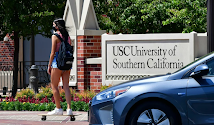The newly renamed Office of Practicum Education, formerly known as the Office of Field Education, within the university's Suzanne-Dworak-Peck School of Social Work, is making the change in order to be more inclusive, according to a memo sent out to faculty and students this week and obtained by NPR.
"This change supports anti-racist social work practice by replacing language that could be considered anti-Black or anti-immigrant in favor of inclusive language," the memo reads. "Language can be powerful, and phrases such as 'going into the field' or 'field work' may have connotations for descendants of slavery and immigrant workers that are not benign."
The change at the USC school comes as a growing number of entities take steps to remove terminology with ties to slavery or racism. Within the computer science field, some people are ditching terms like "master" and "slave," while the Girl Guides of Canada recently renamed its "Brownies" branch. And two offices within the Michigan health department announced this month that their employees will no longer use the term "field workers."
Mildred Joyner, the president of National Association of Social Workers (NASW), said she applauds the USC office for its change — and while she isn't aware of other universities doing the same, she disagrees with those that say the office is going too far.
"I don't know what going too far means," she said. "Does that mean going too far to treat people with dignity and respect and remove all language that oppresses people? Then kudos to that department." (...)
The memo from the USC office, which quickly gained attention on social media, is being met with both support and derision. And students within the department are also split over the decision, according the Daily Trojan, a campus newspaper. Students told publication that they were unsure whether the term "field" truly had racist connotations, and some considered it to be a stretch.
A USC official told NPR that the decision is being made from one office within the department and not the university as a whole.
"The university does not maintain a list of banned or discouraged words," Elizabeth A. Graddy, the university's interim provost and senior vice president for academic affairs, said in a statement to NPR. "We will continue to use words – including 'field' – that accurately encompass and describe our work and research."
by Giulia Heywood, NPR | Read more:
Image: Frederic J. Brown/AFP via Getty Images[ed. The natural evolution of people looking around for something to justify their continued existence. What happens when everything is finally diversified (if ever)? Will these people just go away? See also: No Longer A Selling Point, Some Residents Want 'Plantation' Removed (NPR).]
